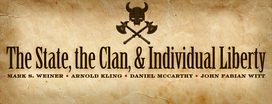Thanks to John Witt for his thoughtful response to my essay and book. It highlights and clarifies some of the issues I addressed in my reply to Arnold Kling and Daniel McCarthy. I’ll take that as a good sign we’re converging around a set of common questions and shared understandings.
I like the way that Witt underscores my view of the liberal state as the “signature middle space of modernity,” and as a “stopping point in the sliding scale” between the extended family and empire. I consider that political space and its institutions to be valuable because of their capacity to protect and advance the substantive value of individual autonomy. I also view that political space to be historically contingent—as historically contingent as the modern conception of selfhood it makes possible—and therefore as fragile, especially in light of the many other illiberal ways of organizing human legal and political affairs that pull on our loyalties. For this reason, I’m deeply concerned about the various trends Witt catalogues that threaten liberal government institutions.
Just to be clear, I don’t wish to make a fetish of the state. The state is valuable to the extent that it helps vindicate certain fundamental liberal values and human needs, and when it doesn’t, it acts improperly or illegitimately. Yet I also view strong government institutions as essential for the project of individualist modernity. My work is intended to clarify these stakes. I take the characteristic libertarian position to be one—I’m speaking broadly here—that’s skeptical about the ability of government to vindicate liberal values without in the long run, and sometimes in the very short run, subverting them, except when the state is simply safeguarding the ability of persons to engage in the private ordering of their affairs. I also take it to condemn almost wholesale those government efforts to advance the solidaristic values of the rule of the clan. As for the anarcho-capitalist view, I do think history strongly suggests anarcho-capitalists want to have their cake and eat it, too. For me, the case for the liberal democratic state and strong public institutions is a case for Witt’s “middle space,” which is in the rare if not unique position to advance liberal values.
I want to stress one of Witt’s interesting formulations. He describes the middle space of the state and the “fictive and constructed” social world it constitutes as “intellectually demanding.” This is an issue I address toward the end of my book, where I characterize modern liberal government not simply as intellectually demanding but also as demanding in cultural terms. Just as the decentralized constitutional order of the rule of the clan depends on a culture of group honor and shame, so modern liberal government and its ability to advance the individual by vindicating the public interest depends upon a variety of underlying cultural values. Constitutionalism and culture are inextricable. As I discuss in my book, I believe this intellectually demanding constitutional culture is captured most clearly, though by no means exclusively, in the perspective of the nineteenth-century British novel and its navigation of the relation between the individual and society—in political terms, between the self and the public interest. There are aesthetic foundations to liberal constitutional freedom well beyond the role of aesthetics in communicating information about status and price.
I’d also like to point us toward one of Witt’s questions. Witt asks us to think about the character of the community the state defines when we discuss the proper functions of the state. This leads me to raise a further query that Kling has posed: what are the features of the modern state that protect the individual as such? Kling’s question, which I raised in a somewhat different form in my response to Kling and McCarthy, underscores the point that for me the rule of the clan is not simply cultural “clannishness,” but rather an alternative way of structuring socio-legal affairs. I believe that radically diminishing the power of government would lead to a loss of personal autonomy as the rule of the clan as an alternate form of legal order invariably would rush to fill the vacuum created by the state’s retreat. But would it? To answer that question, we need to know the full range of functions modern states perform that undergird modern selfhood. Knowing those, we would be in a better position to assess the dangers of the post-modern rule of the clan, which I believe are substantial. Perhaps here we have, to borrow a phrase from common law, yet another interesting joinder of issue?

